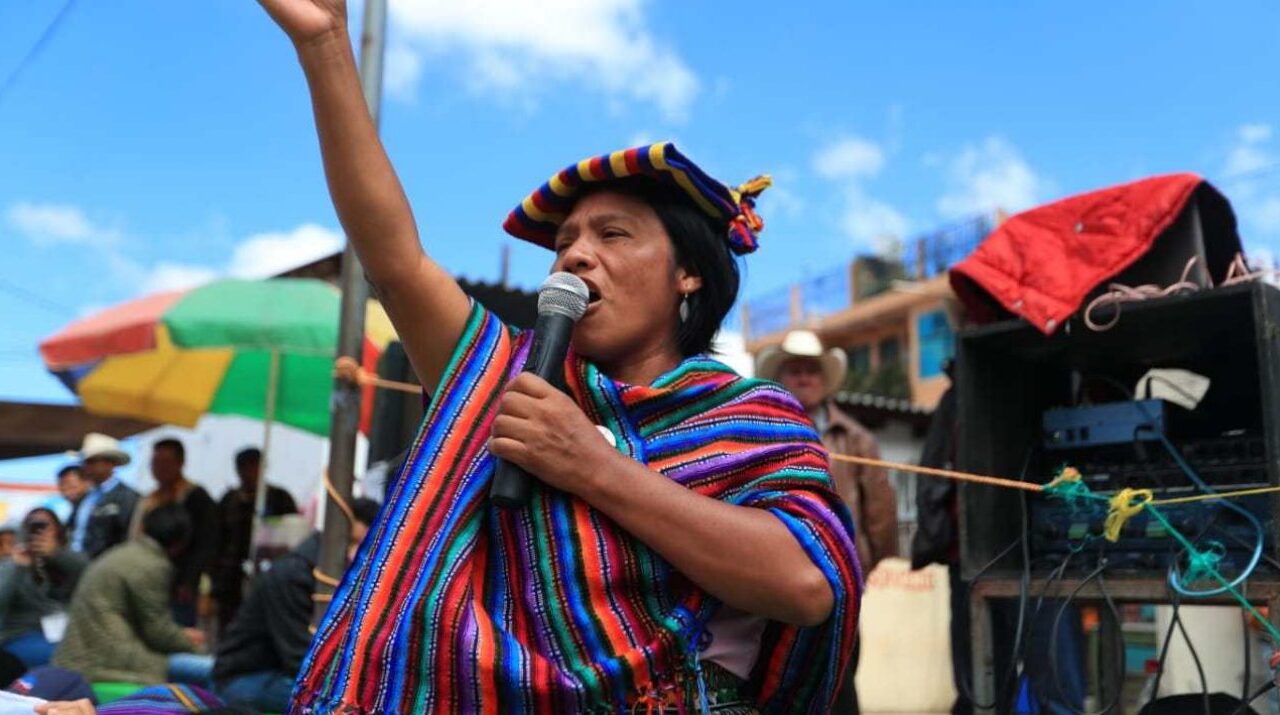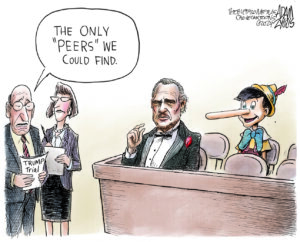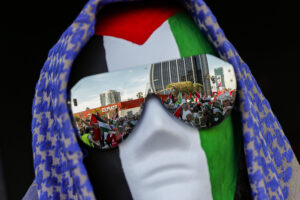Tensions Rise in the Lead Up to the Guatemala Elections
Mass protests against tax measures and the forced displacement of Indigenous communities set the backdrop for Guatemala’s upcoming presidential elections. Thelma Cabrera, Guatemalan Indigenous leader and politician / Photo via Progressive International
Thelma Cabrera, Guatemalan Indigenous leader and politician / Photo via Progressive International
As election campaigns got underway in Guatemala, communities in Totonicapán and Sololá were in the streets, blockading various points along the Inter-American highway.
On March 26th, the people of Totonicapán, Sololá, Quiché, and elsewhere rose up for more than 48 hours against a proposed law that would require small sellers to provide detailed invoices and force them to incorporate into the national tax system.
This communitarian mobilizing, and its articulation with sectors of the popular economy, demonstrate the veto power that can be deployed against the state and its representatives. The government of Alejandro Giammattei had to reverse its proposals, and electoral campaign kickoffs were imprinted with the force of communal resistance.
The protests against taxation are a key development in a country where the violent removal of communities from their lands is a regular occurrence, displacement of women and men towards the United States continues, and the criminalization of community members, representatives of the justice system, and journalists has become an everyday affair.
In Guatemala, like elsewhere in Central America, elite groups are vying—once again—to occupy and exploit the lands of Indigenous people. All of this is at play in the context of the current elections.
Rebellion and Communal Veto Power
In the final months of his presidency, Giammattei tried to breathe life into a political project that’s long been of interest to the Guatemalan elites: incorporating the popular economy into taxation schemes, and forcing small sellers to register with the Superintendency of Tax Administration (SAT).
The proposed measures aim to extract proceeds from popular economies, at the same time as they expand the use of technology for the control and registry of their activities. Access to the internet would become necessary for vendors to connect to platforms where they would generate the detailed invoices required.
Increased taxation and spending burdens, combined with the imposition of a complex and demanding auditing process, represent a threat to the popular economy. It is a threat that was categorically rejected. Communal authorities presented detailed breakdowns of their reasoning against the measures, at the same time as communitarians shut down vital arteries and markets.
Part of what made the protest so powerful was the fact that the Inter-American Highway was shut down by demonstrators defending the popular economy while, simultaneously, others shuttered municipal markets and shops in Totonicapán and Sololá.
The massive protest against these initiatives was organized on March 26 and 27, led by the Governing Council of the 48 villages of Totonicapán and the Indigenous Municipality of Sololá. As the protests went on, more authorities and communities—including market sellers in Chichicastenango, Santa Lucía Utatlán, and elsewhere—joined in.
Part of what made the protest so powerful was the fact that the Inter-American Highway was shut down by demonstrators defending the popular economy while, simultaneously, others shuttered municipal markets and shops in Totonicapán and Sololá.
The mobilization forced various parts of the national political system—including congress, the presidency and the SAT—to withdraw government agreement 12-23, which proposed to force small sellers to issue detailed invoices, as well as proposed Law 6165, which would have incorporated them into the tax system.
Criminalization, Displacement, Migration
Members of communities that are organized in resistance say that during election periods, political parties—be they progressive, socialist, conservative or liberal—attempt to displace local leadership, and in doing so, tear the social fabric that has been reconstructed over past years.
“There’s a lot of arrest warrants against Q’eqchi community members, but no organization or party has mobilized around it, because they’re wrapped up with the electoral campaign,” said one woman about the electoral context in Guatemala City. She asked to remain anonymous out of security fears.
Just as the uprising in defense of the popular economy marked the first days of the campaign, land theft, forced displacement, and criminalization against communities haven’t slowed as campaigns continue.
On April 10 there was an attempt to evict a community in Kumatz de Barillas in the municipality of Huehuetenango in the western highlands. At the end of the same month, the National Civil Police attempted to forcibly remove the Marichaj community from their lands in Alta Verapaz.
Both communities are located in the Northern Transversal Strip, a region that is home to the expansion of palm oil plantations. It is the region with the highest number of forced removals of communities from their lands, according to community members.
On April 23, three community members were detained in the camp where residents of Laguna Larga, in the northern department of Petén, have lived since they were removed from their lands nearly six years ago.
Witnesses say most of the forced evictions take place at night, without a warrant, and often in a violent manner in moments when children and elders are the most vulnerable. That’s exactly what took place in the emblematic case of the eviction in Cubil Witz, in Alta Verapaz in August of 2020, while the country was under a government imposed state of emergency due to the Covid-19 pandemic. Late at night, an armed group began to burn the houses of the 40 families that live in the community.
Indigenous territories are of great importance to the process of capitalist accumulation and dispossession. Last year, the homes and crops of entire communities were set ablaze in Q’eqchi’ territory. In the Northern Transversal Strip and the eastern Polochic area, land theft has left communities without the means of subsistence.
According to Comunidades Indígenas en Liderazgo (Indigenous Communities in Leadership, CIELO), the waves of displacement from certain communities towards the United States correspond with processes of dispossession of their territories.
The Center for Indigenous Languages and Power (CILP), which is part of CIELO, notes that in the more than 30 U.S. states where the organization worked last year, 32 percent of Indigenous migrants are Maya Q’eqchi’, followed by members of Chuj, Mam, and Mixteco communities.
This context is vital in order to understand the conditions that lead to the forced displacement of the 40 young migrants who were burned to death in a migration detention center in Ciudad Juarez at the end of March. Among them were K’iche’, Q’anjob’al, Q’eqchi’, and Mam people from Guatemala, as well as a handful of Hondurans.
Family members of the dead stated the young men had to migrate due to land theft, unemployment, and the impact of flooding leading to crop loss, among other reasons.
Members of communities who have had their lands stolen make their way north in search of a way to support their communities, or to rebuild after an eviction. Last year, more than 94,000 migrants were deported from the United States to Guatemala.
Elections and Judicial Regression
This is the context in which general elections to elect 340 mayors and city councilors, 160 members of congress, and 20 representatives to the Central American Parliament (PARLACEN) will take place on June 25. The second round, should it be required, will be held on August 20.
Lawyer Edie Cux from Citizen Action says there are indications that fraud is being orchestrated via the electoral process, going beyond the manipulation, anomalies, and shoddy logistical management of the vote which have—almost always—been mainstays of general elections in Guatemala.
The electoral process is part of the corporate agenda, and is intertwined with traditional elites and criminal organizations.
This year there are 24 presidential and vice presidential candidates, as well as a candidate and running mate whose candidacy is before the Constitutional Court (CC) pending the resolution of irregularities connected to their registration. On May 2, the CC confirmed the exclusion of Thelma Cabrera as the presidential candidate for the Movement for Peoples’ Freedom (MLP) together with Jordán Rodas, Guatemala’s former Human Rights Ombudsman.
The electoral process is part of the corporate agenda, and is intertwined with traditional elites and criminal organizations. These are the same elites that played a central role in the armed conflict, as is the case of Zury Ríos Sosa, daughter of convicted genocide perpetrator Efraín Ríos Montt. Ríos Sosa is the presidential candidate for the coalition of the Valor and Unionista parties.
Manuel Conde, a former soldier, is the presidential candidate for the Vamos party, which is presently in power, and Giulio Talamonti is the presidential candidate for the Republican Union party, which is connected to powerful military interests.
The last election in Guatemala took place in 2019, when Giammattei and his running mate Guillermo Castillo were elected. Over 60 percent of voters abstained from participating in the elections that year, the highest abstention rate in 20 years. The generalized lack of trust in the electoral system must be understood within the context of the destruction of an important part of the judicial system.
There are currently 38 officials from the justice system and the Public Ministry who are in exile. The exodus of judicial members sped up following the expulsion of the International Commission against Impunity in Guatemala (CICIG) in 2019, and is connected to acts of persecution related to their work attempting to build democratic institutions after the signing of the Peace Accords in 1996.
Last April, members of the Public Ministry involved in investigations into high-ranking soldiers accused of participating in the kidnapping and disappearance of union members, campesinos, students, and members of communitarian processes in the 1980s were shaken up, transferred, and moved to other cases.
Cases of note in this regard include the criminalization of former prosecutor Orlando López, who brought Ríos Montt to trial; the transfer of Hilda Pineda, who was also a prosecutor in the genocide case; as well as that of Elena Sut, a litigant in the Diario Militar case.
Then there’s the case of Juan Francisco Sandoval Alfaro, the former head of the Special Prosecutor against Impunity (FEC), who brought the suit against former Vice President Roxana Baldetti and former President Otto Pérez Molina, both of whom were convicted of corruption in December 2022.
The criminalization of Indigenous communities has served as a laboratory for the ongoing persecution of members of the judiciary.
These conditions are a result of the weakening of the justice system, but also reflect the overall lack of justice throughout the country.
“This has always happened in Indigenous communities: they’ve been imprisoned, there are issues with court delays, violations in their right to defense, and their right to access justice in their own language is violated,” said Maya K’ich’e lawyer Lucía Xiloj. Today, she notes, the kinds of persecution against members of the judiciary mirror those used against Indigenous and criminalized communities.
“There was an attempt to make some reforms to the justice system, which were spurred by Indigenous communities and human rights [activists]” said Xiloj. “First through strengthening the Public Ministry, the [Supreme Court of Justice] and the CC, and through judicial professionalization, but we’re now in a process of regression.”
The Congress of the Republic continues to refuse to elect magistrates to the Court of Appeals and the Supreme Court, which has led to a de facto extension of the mandates of existing magistrates for four years. These magistrates have played a key role in the country’s justice system regression.
These conditions are a result of the weakening of the justice system, but also reflect the overall lack of justice throughout the country.
All of this is taking place in a context of persecution and jailing of representatives of communal political structures involved in resistance movements, members of community radio stations, and Indigenous and urban journalists. The 2023 elections may well be the most questioned in the 27 years since the signing of the Peace Accords.
In many communities, the presence of the state is felt only through the violence it enacts. Meanwhile, communities defend and reinforce their own systems of government. They know their needs and horizons don’t fit in the ballot boxes of landowners, criminals, and current and former soldiers.
While Presidents come and go, it is these communal structures that continue to defend the land, the water, the popular economy, and from where the struggle for memory is waged.
Your support matters…Independent journalism is under threat and overshadowed by heavily funded mainstream media.
You can help level the playing field. Become a member.
Your tax-deductible contribution keeps us digging beneath the headlines to give you thought-provoking, investigative reporting and analysis that unearths what's really happening- without compromise.
Give today to support our courageous, independent journalists.






You need to be a supporter to comment.
There are currently no responses to this article.
Be the first to respond.